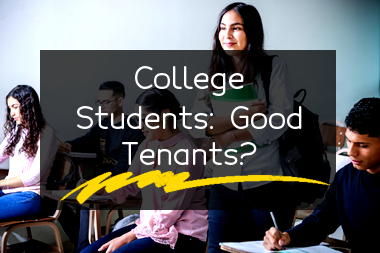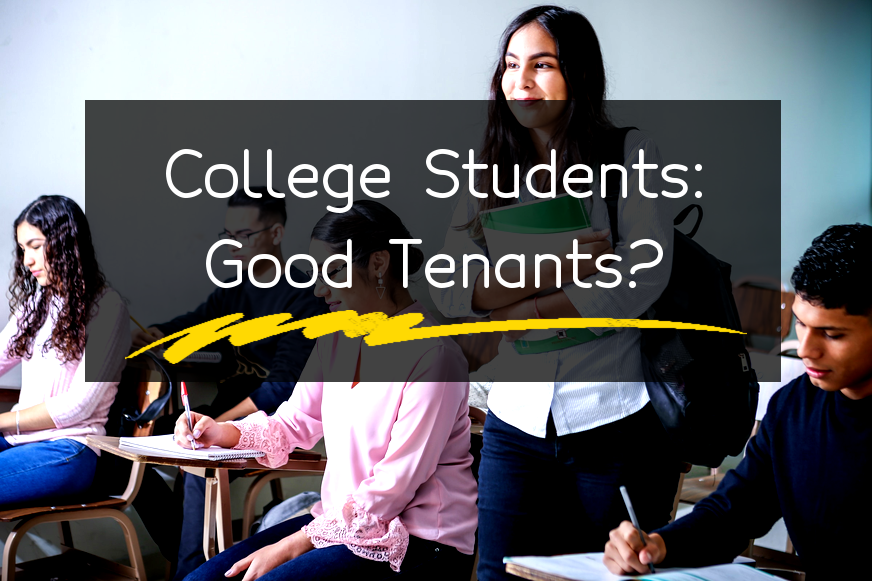Landlords should rent to college students because:
- 1. Steady Income: College students usually have a steady income from their part-time jobs or student loans. This means they are less likely to default on rent payment.
- 2. Higher Demand: College students need housing during their academic years. This ensures high demand for rental properties near a college, which means landlords will have a stable flow of tenants.
- 3. Short leases: College students usually need housing for only a few years, which means landlords don't have to worry about managing long-term tenants.
On the other hand, landlords may have concerns about renting to college students based on:
- 1. Potential damage: College students might not have the same accountability as long-term tenants. For instance, they may cause property damage or be noisy, making it hard to manage the living environment for other tenants.
- 2. Lease violations: College students can violate lease provisions more often, which puts landlords at risk of losing their investment.
- 3. High turnover: College students move frequently, making landlords struggle with managing vacancies that eat into their finances.
Ultimately, landlords will need to assess their options based on the unique features of their rental properties and the kind of tenants they want to attract.
5 Pros of Renting a House to College Students
- 1Steady rental income: College students are a reliable source of rental income as they typically pay their rent on time. This can provide a stable financial income for landlords.
- 2Potentially higher rental rates: Landlords can charge higher rent for college students, especially if the house is near the campus or if it is in a popular student location.
- 3High demand: College students are always in need of suitable housing that is close to the campus. This makes renting out a house to college students a profitable venture for landlords.
- 4Short leases: College students typically only stay for a semester or a year, making the renting period shorter than renting to a regular tenant. This can give landlords the flexibility to change rental rates or renovate the house once the lease is up.
- 5Responsibility: College students are often willing to take on tasks like yard maintenance and minor upkeep in exchange for reduced rent or to show that they are responsible tenants. This can save landlords both time and money.
Cons of Renting a House to College Students
- 1Unpredictable monetary flow: College students may not always have the financial stability to pay rent on time or at all. This can cause financial disruptions and could result in financial loss to the landlord.
- 2Damage to property: College students are known to be less responsible in taking care of property; they may damage property unknowingly or intentionally. This could lead to costly repairs and may affect the future tenants.
- 3Noise: College life is full of social activities which could lead to noisy partying. This could result in angry neighbors or police involvement, leading to house owners being held responsible.
- 4Short term lease: College students are known for living in shared accommodations for short periods; this makes it difficult to find tenants to rent the house for an entire year, which could result in a loss of income for the landlord.
- 5Legal obligations: The landlord could face legal consequences, for example, if college students have been running drugs from the house. The owner could be held accountable for allowing illegal activities in the property.
- 6High turnover rates: College students often move frequently, which means the house would be vacant for longer periods, leading to less income and a possibility of the property depreciating in value.
Tips for Renting to College Students Profitably
Renting to college students can be a profitable venture, but it can also come with its own set of challenges. Here are some tips for renting to college students profitably:
- 1Choose a strategic location: Renting a property close to a college or university can often be very profitable. By doing this, students are incentivized to rent from you because it gives them easy access to classes, campus activities, and other amenities.
- 2Furnish and equip the property: Most college students don't have a lot of money to invest in furnishings or equipment for their rental homes. By offering a fully furnished and equipped property, you can save students a significant amount of money and make your rental property stand out from the competition.
- 3Be clear about your rental policies: Make sure you establish clear rental policies and penalties for breaking them. This can include things like no parties, no smoking, and no pets. Establishing these policies upfront will reduce potential problems down the road.
- 4Screen tenants carefully: As with any rental property, screening tenants is an important process. Be sure to check references and credit scores, as well as income and employment records to ensure tenants can afford to live in your property.
- 5Offer flexible lease terms: College students schedules are often unpredictable, which makes it difficult to commit to long-term leases. Offering flexible lease terms can help increase rental occupancy rates. Additionally, allowing tenants to renew their leases for multiple semesters (if they're good tenants) can also provide a steady stream of rental income.
- 6Provide extra perks: Offering extra amenities can help attract and retain tenants, which can include things like free Wi-Fi, in-unit laundry facilities or a washer, and dryer in a shared laundry facility, and 24/7 maintenance support.
By following these tips for renting to college students profitably, you can make your rental property a highly sought-after place to live, increase rental income, and ensure long-term occupancy.
Final Thoughts
Renting to college students can be a lucrative business for landlords, but it comes with its own set of challenges and considerations. College students are often considered a high-risk demographic due to their unpredictable behaviors, lifestyle, and limited income. However, not all college students are the same, as some are more responsible, respectful, and stable than others.
Landlords who decide to rent to college students should carefully screen applicants, conduct thorough background checks, and lay down clear rules and regulations to ensure the safety, security, and well-being of both the landlord and the tenants. They should also be prepared to handle various issues, such as late rent payments, noise complaints, damages, and maintenance requests.
On the other hand, landlords who prefer more stable and reliable tenants may choose to avoid renting to college students altogether. They can target other rental markets, such as working professionals, families, or retirees, who may offer a higher return on investment and less hassle.
Ultimately, the decision to rent to college students depends on each landlord's individual preferences, risk tolerance, and business strategies. They should consider the pros and cons of renting to this demographic, weigh their options, and make an informed decision based on their specific needs and circumstances.
Just one more thing: if you liked the article, please like us on social media and share this article with friends.



